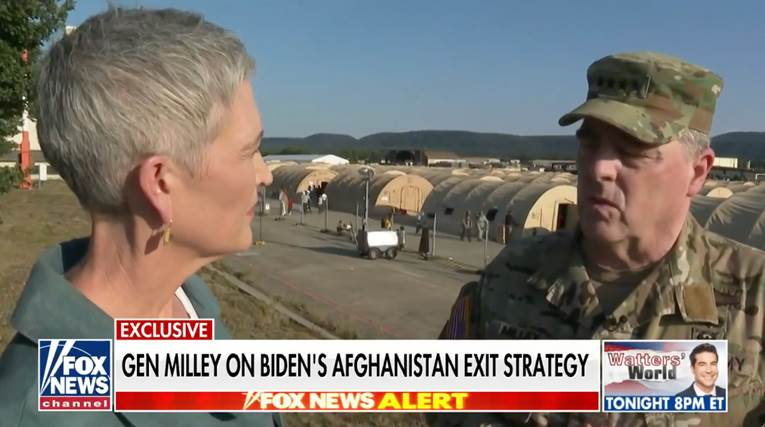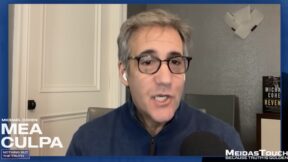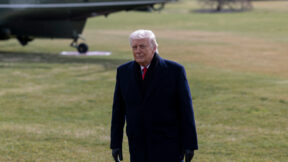Mediaite Q&A: Jennifer Griffin on General Milley, Afghanistan, Covering the Pentagon and More

Over the past several weeks, Fox News national security correspondent Jennifer Griffin, along with her colleagues in the Pentagon press corps, have been busy, from covering the U.S. withdrawal from Afghanistan to the allegations surrounding Joint Chiefs Chairman Gen. Mark Milley and his calls with his Chinese counterpart in the final months of the Trump administration, which was revealed in excerpts published last week of a book by The Washington Post’s Bob Woodward and Robert Costa.
Griffin has demonstrated over the past several weeks that she is unafraid to press Pentagon leadership on these stories. For example, during one of the Pentagon press conferences last month, she asked a question that no one was asking the Biden administration: Why not retake Bagram Air Base, a crucial military installation that had already been given up by the United States, for evacuations given the chaos at the airport in the Afghan capital of Kabul. (Bagram could have been used for evacuations since it has two runways, whereas the airport in Kabul, which was being used to airlift people out of Afghanistan, only has one runway.)
On Friday, Mediaite interviewed Griffin over the phone about those issues and more.
The interview has been edited for brevity and clarity.
You recently interviewed General Milley. Given your critical reporting of the administration’s handling of the withdrawal and evacuation from Afghanistan, were you surprised to land an interview with Milley? Is landing an interview a lesson to reporters to prioritize being tough but fair with our leaders over worrying about gaining access to them?
I’ve always been fair. I’ve been covering the Pentagon for 14 years. Everybody knows in that building that I don’t pull my punches. And you saw during the three weeks of this conferences, I often was the one to be given the second question. The press briefings, typically, the first question goes to the wire services. I’ve been covering the building for a long time. I ask the questions that I felt that most Americans wanted answered or when I saw daylight between things that leaders or different government agencies were saying. I asked the sharpest and strongest questions that I could. I think the people in the Pentagon appreciate the opportunity to answer those questions. I don’t tiptoe around when I and I call things as I see them.
And so the interview that I got with Gen. Milley was an opportunity to go see what was happening in Europe where tens of thousands of Afghan evacuees were being brought in and the U.S. military was being asked to be able to, basically, build cities on these military bases and screening centers. It was an opportunity for me as a reporter to see something firsthand. It was, also, really a landmark opportunity. Fox News gave Gen. Milley 15 minutes at the top of our prime time programing on Saturday night to where I was allowed to ask any question I wanted. I asked the questions that I think were most on the minds of both the rest of the Pentagon press corps as well as the American people.
The Pentagon press briefings have lately been understandably contentious with you and your colleagues asking tough questions of Pentagon leadership and John Kirby. What can young or aspiring journalists learn from those briefings? How do you maintain a professional relationship with Pentagon leadership and Kirby despite your tough questioning and frustration whether it be their answers or not being called on?
I talk to a lot of reporters who are either new on the beat or younger women reporters who come to me and ask for advice. One of my best pieces of advice is short and direct questions. When you start making statements and you start going too long or you have too many parentheticals, you give the person at the podium wiggle room out. Ask short and direct questions. I think the reason people call on me at those briefings is that I ask direct questions, questions that they may or may not want to answer. I follow up.
Also, it’s important to follow up. It’s important not to grandstand during press conferences, but it is important to get to the point and hold the person at the podium’s feet to the fire. That is what our job is. That’s what the American people expect.
Are you concerned that the press, not yourself personally, will shift gears from covering the situation in Afghanistan even as Americans and Afghan allies are stranded and the Taliban and other terrorist groups have taken over the power vacuum there?
I’m very concerned. I’ve been going to Afghanistan and covering Afghanistan since 1993, and that was when we were living in Islamabad. My husband’s a journalist. We were based in Islamabad. I want to give a particular shoutout to my colleague Trey Yingst, who is on the ground in Kabul. Fox has a presence in Kabul right now and it is so important. The stories that he’s doing right now are absolutely crucial.
I also want to give a shoutout to the woman who has been covering Afghanistan longer than any other reporter, the AP’s Kathy Gannon. She and I worked together back in the 90s and she was the first and she covered Afghanistan back when the Mujahedeen and Soviets were fighting. She was the first reporter in Kabul on the night of 9/11, and she went back to Kabul after the Taliban took over. And she has remained there ever since. This kind of on the ground reporting is so very crucial. So what I’m doing at the Pentagon is holding the U.S. government and leaders to account and what those field reporters – Trey Yingst and Kathy Gannon – are doing.
We cannot forget about Afghanistan. There will be likely be a rise in in terror groups taking advantage of the chaos there. You have the Taliban in control. It is a moral obligation to continue covering Afghanistan.
Why do you think there will be that shift? Is it due to what people accused many in the media of doing, which is covering for the Biden administration?
I really think that’s a very loaded question. I would say that what I’ve seen in my lifetime when I was a foreign correspondent for 16 years and as a reporter in Washington, is that resources have shifted and all news organizations have closed bureaus overseas. The American public is less informed about what is happening overseas because we don’t have as many reporters and journalists, American journalists going to those countries and covering those countries. The contraction of the news industry and how local papers here in the States have closed, and the crisis in reporting on the ground and having eyes and ears whether in foreign capitals or countries or here at home and in our state capitals and covering local news, it is a crisis and it does not make us better informed and it does not lead to better policy decisions.
Given the U.S. withdrawal from Afghanistan, how closely are you watching out for a potential U.S. withdrawal from Iraq? Is this a story that reporters should keep an eye out for?
It absolutely should. And I’ve been following that very closely, as well as in Syria. We still have about 900 troops in Syria keeping an eye on ISIS and there’s still a very large prison there that that has a lot of very bad characters that nobody wants. No foreign governments want to repatriate those prisoners and many of them are known terrorists. And so the U.S. military and the small presence they have in Iraq and Syria are very crucial to keeping stability just as they were in Afghanistan and we saw what happened when they pulled out. A very unstable situation has evolved.





Comments
↓ Scroll down for comments ↓